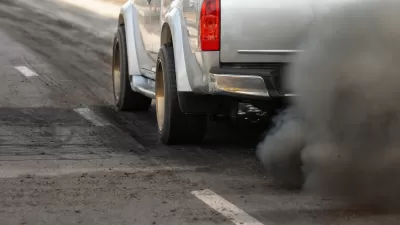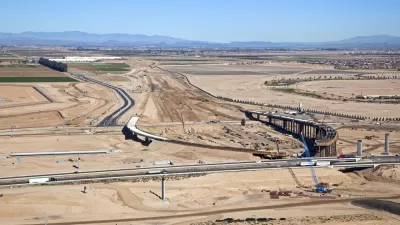A recently proposed rule, the Greenhouse Gas Emissions Measure, would require state and regional planning powers to track and reduce emissions from the U.S. highway system.

The Federal Highway Administration (FHWA) in July proposed a new rule that would require state departments of transportation (DOTs) and metropolitan planning organizations (MPOs) to measure and reduce greenhouse gas emissions created by the National Highway System (both interstate freeways and U.S. highways).
The Greenhouse Gas Emissions Measure (GGEM), as the proposed rule is called, would not mandate specific targets for reductions. “Rather, State DOTs and MPOs would have flexibility to set targets that are appropriate for their communities and that work for their respective climate change and other policy priorities, as long as the targets would reduce emissions over time,” according to Notice of Proposed Rulemaking on the Federal Register.
Transportation for America has written a blog post in partnership with Evergreen Action to support the proposed rule (“a critical tool to foster accountability and steer infrastructure investments toward better climate outcomes”) and provide recommendations for how the Biden administration states can maximize the potential of their emissions reduction efforts. The recommendations, with more details included at the source article, are as follows:
- The Biden administration must finalize a strong performance measure rule ASAP
- The Biden administration must finalize a strong performance measure rule ASAP
- States should incorporate performance measures in state policy and go beyond USDOT’s proposal
- States should incorporate performance measures in state policy and go beyond USDOT’s proposal
The FHWA will receive comments on the proposed GGEM until October 13, 2022.
FULL STORY: Four ways states and the Biden administration can curb transportation pollution

Trump Administration Could Effectively End Housing Voucher Program
Federal officials are eyeing major cuts to the Section 8 program that helps millions of low-income households pay rent.

Planetizen Federal Action Tracker
A weekly monitor of how Trump’s orders and actions are impacting planners and planning in America.

Ken Jennings Launches Transit Web Series
The Jeopardy champ wants you to ride public transit.

Driving Equity and Clean Air: California Invests in Greener School Transportation
California has awarded $500 million to fund 1,000 zero-emission school buses and chargers for educational agencies as part of its effort to reduce pollution, improve student health, and accelerate the transition to clean transportation.

Congress Moves to End Reconnecting Communities and Related Grants
The House Transportation and Infrastructure Committee moved to rescind funding for the Neighborhood Equity and Access program, which funds highway removals, freeway caps, transit projects, pedestrian infrastructure, and more.

From Throughway to Public Space: Taking Back the American Street
How the Covid-19 pandemic taught us new ways to reclaim city streets from cars.
Urban Design for Planners 1: Software Tools
This six-course series explores essential urban design concepts using open source software and equips planners with the tools they need to participate fully in the urban design process.
Planning for Universal Design
Learn the tools for implementing Universal Design in planning regulations.
Heyer Gruel & Associates PA
Ada County Highway District
Institute for Housing and Urban Development Studies (IHS)
City of Grandview
Harvard GSD Executive Education
Toledo-Lucas County Plan Commissions
Salt Lake City
NYU Wagner Graduate School of Public Service




























